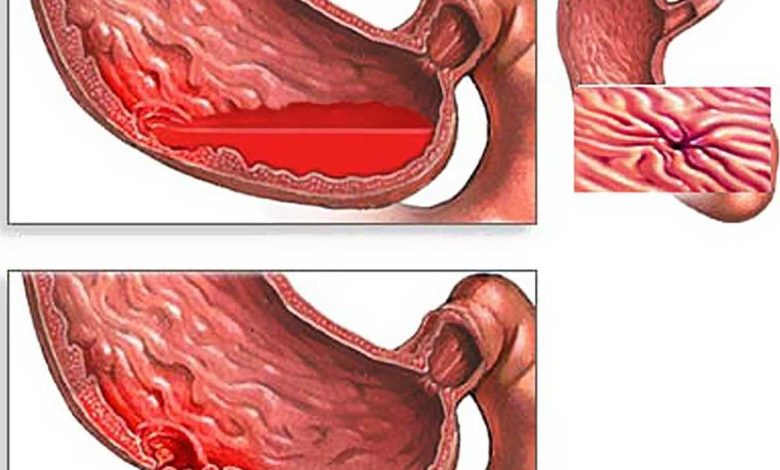Gastrointestinal bleeding: what is this, the cause of the, symptoms, diagnostics, treatment, prevention

Gastrointestinal bleeding – What is this disease?
Gastrointestinal bleeding is a serious complication of diseases of the gastrointestinal tract (most often, ulcers stomach and duodenal ulcers). This condition can be life threatening.
Gastrointestinal bleeding: the cause of the
Source of gastrointestinal bleeding may be localized in all departments of the gastrointestinal tract. Bleeding complicated by peptic ulcer, erosive gastritis, Mallory-Weiss Syndrome (gastrorrhagia, due to breaks of the mucous membrane of abdominal esophagus or cardiac stomach Division with hard recurrent vomiting), varicose veins of the esophagus and stomach, nespetsificheskiy yazvennыy colitis, bowel polyps and diverticula, benign and malignant tumors of gastrointestinal tract, hemorrhoids, etc.
Gastrointestinal bleeding causes changes in the body, the severity of which depends on the pace and magnitude of bleeding blood loss. Depending on the amount of blood loss distinguish light, moderate and severe. When massive blood loss bleeding called profuse bleedings.
Gastrointestinal bleeding symptoms
Symptoms of gastrointestinal bleeding depend on the localization of the source and extent of the bleeding.
Gematomezis is a vomiting fresh blood and indicates bleeding from the upper gastrointestinal divisions usually from blood source or varicose veins.
Bloody stool is an allocation of "dirty" blood from the rectum and usually indicates a lower GI bleeding, but it may also be the result of massive bleeding from the upper gastrointestinal tract with rapid transit of blood through the intestines. Melena is black, tarry stool and definitely indicates bleeding from the upper gastrointestinal divisions, but the source of bleeding may also be localized in thin or in the right half of the colon.
Heavy bleeding can occur in patients showing symptoms of shock (e.g.., tachycardia, tachypnea, paleness, Sweating, oligurija, confusion).
In patients with chronic bleeding can be the symptoms and signs of anemia (e.g.., weakness, easy fatigability, paleness, chest pain, dizziness). Gastrointestinal bleeding can accelerate development of liver encephalopathy or Hepato-renal syndrome (secondary renal failure in liver failure).
Diagnosis of gastrointestinal bleeding
Diagnosis of gastrointestinal bleeding is determined on the basis of the:
- analysis of medical diseases and complaints (when symptoms of the disease, what the patient Associates their emergence and development);
- history of life (past medical history, bad habits, heredity);
- clinical examination. In addition to the General inspection, If gastrointestinal bleeding requires rectal examination (examination of the rectum). It helps to identify the characteristic discoloration of feces, and when bleeding from colorectal cracks or hemorrhoids — discover the source of the bleeding;
- General blood analysis-helps to detect reductions in the number of erythrocytes and hemoglobin, characteristic of bleeding;
- occult blood feces analysis-helps detect traces of blood in the stool, If the number of lost blood was not enough to change its coloring;
- blood platelets (When bleeding, associated with bleeding disorders);
- coagulogram (blood test, reflecting the speed and quality of the process of blood clotting);
- endoscopy studies. At a bleeding from the upper gastrointestinal divisions to the UPPER (out fibroezofagogastroduodenoscopy).
Gastrointestinal bleeding: classification
Classification, highlights 4 the severity of bleeding:
Grade I – general condition is satisfactory; moderate tachycardia; HELL not changed; Nr above 100 g / l; deficiency of BCC – no more 5% from the due;
Grade II: general condition – moderate, slackness, dizziness, insensibility, pale skin, a significant tachycardia, reducing ad to 90 mmHg; Hb – 80 g / l; deficiency of BCC – 15% from the due;
Grade III – the overall condition of heavy; Skin pale, cold, Sticky sweat; the patient yawns, requested drink (thirst); Pulse is a frequent, threaded; HELL is reduced to 60 mmHg.; Hb – 50 g / l; deficiency of BCC – 30% from the due;
(IV) degree – the General State of dire, It is bordered by agonal'nym; prolonged loss of consciousness; pulse and HELL are not defined; deficiency of BCC – more 30% from the due.
Patients with II-IV degrees of gravity bleeding require infusion therapy before diagnostic and therapeutic manipulation.
Gastrointestinal bleeding: patient actions
It is very important to seek medical advice in a timely manner.
Gastrointestinal bleeding treatment
Treatment of gastrointestinal bleeding includes:
- strict bed rest;
- filling volume of blood lost;
- intravenous and intramuscular Hemostatic (kroveostanavlivajushhih) preparations;
- intravenous and intramuscular iron for correction of anemia (anemia);
- surgery (surgical bleeding) sometimes is required, the ineffectiveness of medical treatment.
Gastrointestinal bleeding: complications
Delay in accessing specialist at the first signs of gastrointestinal bleeding or attempt self-treatment can lead to serious or even fatal.
Prevention of gastrointestinal bleeding
Prevention and timely treatment of diseases, that can cause gastrointestinal bleeding.
